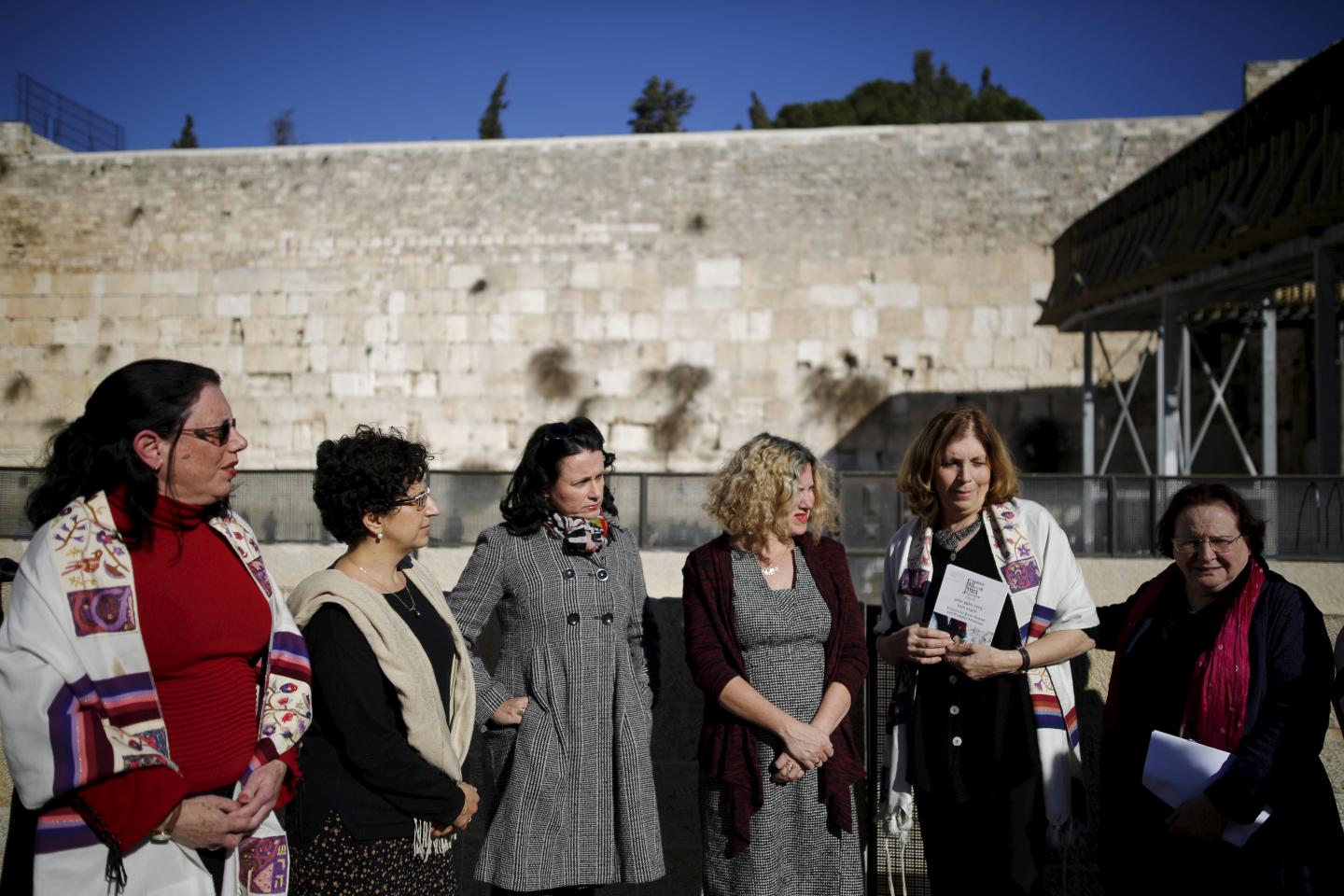 Members of activist group Women of the Wall speak to the media following the Israeli government’s decision to create an egalitarian prayer plaza near Jerusalem’s Western Wall, January 31, 2016. (Photo: Amir Cohen/Reuters)
Members of activist group Women of the Wall speak to the media following the Israeli government’s decision to create an egalitarian prayer plaza near Jerusalem’s Western Wall, January 31, 2016. (Photo: Amir Cohen/Reuters)
I have been spat and yelled at (and worse) while davening at the Kotel. I stand behind the efforts to bring egalitarian services there. I am a supporter of Women of the Wall (WOW). And I am pained (but somehow not surprised) by the recent reversal by the government, which does feel like a betrayal, and which stymies admirable efforts to open the Kotel to the full array of Jewish religious expression.
And at the same time, I choose not to wring my hands or wallow today. I choose to celebrate, and thus identify with Rabbi Akiva in the famous story from the Talmud in which his rabbinic peers tore their garments upon seeing the ruins of Jerusalem. They see the moment frozen in time, a destruction prophesied by a particular biblical verse. Rabbi Akiva smiles, however, reminding them that the end of that very verse also prophesies redemption. Now that the nadir envisioned by the verse has come to pass, the eventual ascension/aliyah is also inevitable.
So why do I celebrate today? Because even though the Charedi hold on Israeli politics is at times painful and corrupt, as the Kotel fiasco attests, for me, redemption is not tied to a particular wall. I am sometimes bemused by the fact that so much focus is put on prayer at the ruin of the Temple by the very Jews who least ache for that spot to re-emerge as the center of Jewish spirituality. For the progressive-traditional Jew, who sees rebirth of meaningful and resonant Judaism within Israel as one of Zionism’s greatest contributions and challenges, what transpires at the Kotel may be symbolically important, but pales in comparison to the evolutions transpiring throughout the land — the mash-up of secular seekers and traditional liturgy at various Kabbalat Shabbat phenomena that are growing; the strength and vitality of Masorti and Progressive synagogues and communities despite the infrastructural challenges that inhibit them; the will exhibited by myriad Israelis to reject the authority and monopoly of the rabbanut by making decisions (which, yes, they ought not have to make) to marry creatively rather than under near-theocratic conditions.
Last summer, I attended a cousin’s wedding on an Orthodox kibbutz, where the officiant was female, and at which the hordes of sweaty, tzitzit-flying, tichel-wearing attendees saw no conflict between traditional Jewish rituals and practice on the one hand, and female religious leadership and party-style mixed-dancing on the other. This same cousin, who helped found yet another Orthodox/egalitarian minyan in the Katamon neighborhood of Jerusalem, recently posted on Facebook wishing a mazel tov on the recent wedding … of Moshe and Eran, two of his closest male friends and fellow B’nai Akiva alumni.
I’d tear a tiny thread in my clothes, as I really do wish that on my next visit to the Kotel, I and my daughters can pray in the manner we find sacred. But this symbolic setback is dwarfed by the extraordinary successes we see playing out in spots that are, indeed, more important to the Jewish future even than those venerable stones.
I honor the leaders of WOW and wish them strength. And yet I know we will not win every engagement. And the perfect is the enemy of the good. And Robinson’s Arch is a beautiful place to hold egalitarian prayer (and a bit shadier, too!). And if we scope out beyond those square meters, and if we are witness to (and financially contribute to) the efforts to egalitarian-ize and modernize and evolution-ize the many Judaisms of modern Israel, then we can stand with Rabbi Akiva, and celebrate the burgeoning redemptions.
Rabbi Adam Kligfeld is senior rabbi of Temple Beth Am.






















 More news and opinions than at a Shabbat dinner, right in your inbox.
More news and opinions than at a Shabbat dinner, right in your inbox.